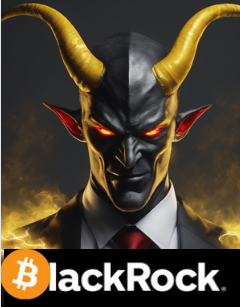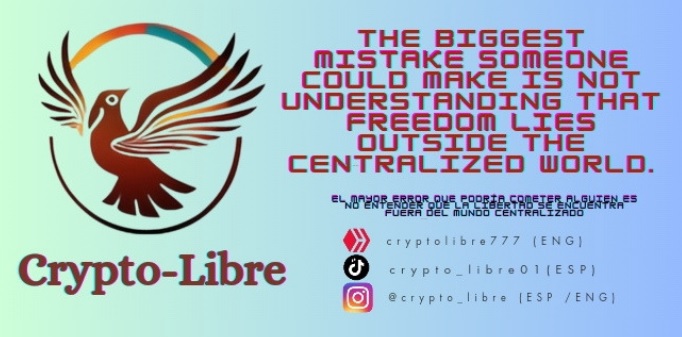BlackRock and its controversial Bitcoin ETF: Salvation or threat to cryptocurrency?

The possibility that BlackRock, the world's largest asset manager with approximately $10 trillion under management, launches a Bitcoin ETF (exchange traded fund) referenced to the current or "spot" price of Bitcoin, has generated a heated debate within the crypto community.
For some, the entry of a Wall Street giant like BlackRock into the field of cryptocurrencies through this spot ETF would be the blessing Bitcoin needed to consolidate itself in traditional financial markets.
Their hope is that an ETF backed by such a powerful firm attracts a wave of institutional investors, skyrocketing demand and therefore catapulting the price of the cryptocurrency to record levels, potentially far exceeding its all-time high of almost $69,000 per Bitcoin.
On the other side are those who look with distrust and skepticism at the real motives behind BlackRock's foray into the crypto world. They question whether the intention is really to benefit Bitcoin or if it is a strategy of the financial giant to capitalize on and control a market that so far has been relatively free from Wall Street's influence.
They warn of serious risks, such as the possibility that BlackRock issues more ETF shares than it could support with real Bitcoin reserves, artificially inflating its value. Or that it uses its power to force changes in Bitcoin's decentralized protocol and put it under the control of large players like themselves.
Faced with this polarized debate, can BlackRock's intentions really be trusted? Does its entry represent a validation and opportunity for Bitcoin or a threat to the decentralized essence that defines it? Let's analyze the arguments in detail.
BlackRock: Bitcoin's ally or enemy?
For enthusiasts, the fact that a company as powerful as BlackRock is betting on Bitcoin shows that cryptocurrencies are here to stay. An ETF from the firm would attract many conventional investors and trigger massive purchases that would catapult the price, perhaps surpassing new all-time highs.
However, other analysts point out that, historically, ETFs referenced to commodities like gold rarely maintain sufficient reserves of the physical asset. That is, they artificially inflate the value of the fund's shares without having a real backup.
This could also happen with a Bitcoin ETF, in which BlackRock issues more shares than it could support with its actual BTC holdings.
The challenges of accumulating large amounts of Bitcoin
Unlike other assets, it is difficult to quickly accumulate large amounts of Bitcoin, since its supply is limited and depends on the voluntary sale of its current holders.
In addition, the transaction processing capacity of the Bitcoin network is limited, which would make it even more difficult for BlackRock to purchase tens or hundreds of thousands of BTC in a short time to support a growing ETF.
This leads to thinking that, if it does not operate transparently and while maintaining 100% audited reserves, BlackRock could resort to artificially inflating the value of the ETF's shares.
Will BlackRock try to change Bitcoin's decentralized essence?
Another major concern has to do with the possibility that BlackRock will use its influence to force a change in the Bitcoin protocol from a decentralized mining system (Proof-of-Work) to one dominated by large players (Proof-of-Stake).
This would benefit BlackRock, but would destroy the very essence of Bitcoin by sacrificing decentralization and individual user power in favor of large interest groups.
However, achieving such a change would be extremely difficult, since it would require convincing the vast majority of miners to act against their own interests.
Can BlackRock be trusted?
Beyond speculation, no one has a crystal ball to predict BlackRock's true intentions with its Bitcoin ETF. Some give them the benefit of the doubt, but their track record is far from pristine.
For example, in 2008 CEO Larry Fink boasted of "doing God's work" while the company benefited enormously from the financial crisis through rescue and advisory services to large banks and insurers.
This gives an idea that BlackRock knows how to take advantage of market crises and volatility, even at the expense of small investors.
More recently, Fink has advocated in his annual letters for greater regulation and supervision of cryptocurrencies by governments. While this may sound reasonable, excessive regulation could end up stifling innovation in the crypto asset sector and concentrating power in a few dominant institutions like BlackRock.
Another questionable move by the firm was the hiring of Brian Deese, who had been Obama's climate advisor and helped negotiate the Paris Agreement, but later moved to the private sector to lead sustainability at BlackRock, despite the firm's continued heavy investment in fossil fuels. This raises doubts as to whether they really prioritize sustainability or just engage in greenwashing.
They have also been criticized for making large donations to politicians and then lobbying for policies that benefit them. For example, in 2021 BlackRock spent more than $1.5 million on lobbying according to data from OpenSecrets.org, an organization that monitors money in politics. Finally, BlackRock has been sued several times for management practices that generated high fees for themselves but low returns for their clients.
All of this points to the fact that BlackRock has historically put its profits before the interests of its clients, the environment, and society in general. This is why its entry into the field of cryptocurrencies should be viewed with caution and its actions closely monitored.
The possibility of a Bitcoin spot ETF by BlackRock has sparked a polarization between those who see it as positive and those who believe it could damage the ecosystem. It is most likely that the effects will not be black and white, but there is always a latent risk that a company with the power of BlackRock will use its ETF to manipulate the price of Bitcoin or even undermine its fundamental principles.
Maintaining healthy skepticism and preserving the decentralized essence of Bitcoin seem the best recipe in this debate. Time will tell if BlackRock will actually help empower more individuals through this technology or seek to control it for its own benefit.
The images presented in the publication are my property and creation (Photopea).
Sorry for my lack of skill with the use of tags, if you think any of them are out of context please point out my mistake, I'm still learning to use this social network and I'm still not skilled in some things.

Congratulations @cryptolibre777! You have completed the following achievement on the Hive blockchain And have been rewarded with New badge(s)
Your next target is to reach 200 upvotes.
You can view your badges on your board and compare yourself to others in the Ranking
If you no longer want to receive notifications, reply to this comment with the word
STOPCheck out our last posts: